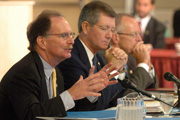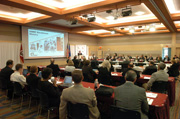RIVER FALLS, Wis. – The University of Wisconsin System Board of Regents today urged state legislators to pass a budget that covers the university’s ongoing operating expenses. The Regents hope to avoid drastic cost-cutting measures in the Spring 2008 semester that may come if UW campuses don’t receive state funding soon.
Regent President Mark Bradley opened the discussion by citing broad grassroots support for the university from business leaders, students, faculty members, newspaper editors, and elected officials. He emphasized that Republicans and Democrats alike have encouraged legislative leaders to fund the UW System’s “Growth Agenda for Wisconsin.”
“It’s easy to be impressed by the number of people who have written letters in support of our budget, but it’s also impressive to look at the broad base of that support and the consistency of the message,” said Bradley.
UW System President Kevin Reilly explained how the UW System will be challenged to launch the Growth Agenda, which would expand enrollments and boost scientific research, if the state does not fund the university’s core educational programs and student services.
In a unanimous resolution, the Regents acknowledged that UW System campuses do not have funds needed to cover current operating costs, because the absence of a state budget leaves revenue frozen at last year’s levels.
UW-River Falls shows how it is “Living the Promise”
As the St. Croix Valley’s learning nucleus situated in Wisconsin’s western “frontier of opportunity,” the University of Wisconsin-River Falls is poised and prepared for the dynamic growth evident in this region, said University of Wisconsin-River Falls Chancellor Don Betz in welcoming the UW System Board of Regents on campus Thursday.
Regents heard four separate presentations from UW-River Falls educators and students Thursday, all focusing on the campus’s plans for “walking the walk” when it comes to its future plans. Because UW-River Falls is located in one of the fastest-growing areas of the state and an essential part of the Metropolitan Statistical Area of Minneapolis-St. Paul, the economic growth prospects for the western counties of Pierce, Polk and St. Croix are astounding, Betz said, and the university is a “serious player in shaping the quality of life and the pool of conscientious leader-citizens for the region.
“We are among the largest economic engines in this region, and fuel the growth and development of River Falls, the St. Croix Valley and the surrounding areas,” Betz told the Regents. “With resources and flexibilities, however, enrollment could significantly increase. We embrace the UW System’s Growth Agenda and the goals of the emerging Advantage Wisconsin Strategic Plan. They are inextricably interwoven and both must be credibly resourced as sustained state priorities to be truly successful,”
In a presentation to the full Board, Betz outlined the University’s Strategic Plan called “Living the Promise.”
“In the goals and initiatives of ‘Living the Promise’ we are trumpeting the power of learning. … In our compressed, globalized world, the power of learning will aid us in devising vital collaborative solutions to immediate and protracted local and global issues.”
Toward that aim, the University has formed the St. Croix Institute for Sustainable Community Development to offer expertise to the communities, townships, cities and villages of western Wisconsin as they meet the reality of growth challenges along the I-94 “collaboration corridor,” Betz said. Moreover, the UWRF has helped facilitate the newly formed Western Wisconsin Intergovernmental Collaborative to offer a common forum for the 99 municipalities in the region.
Regents then heard a presentation on the new institute by Professor Kelly Cain, director of the SCISCD, who outlined the broad reach of the institute’s mission.
“We are looking at this issue from an ‘unsustainability’ standpoint rather than a sustainability standpoint,” he said about the institute’s mission to become one of the premiere venues for deliberation and demonstration of sustainable community development principles. “It’s easy to talk about the crisis, but it’s more important to look at the opportunities. It is the single greatest opportunity of the 21st century. We are clearly at a turning point where leadership is sustainable community development is not only not an option, it is imperative to the well-being of our community, state, nation and the planet. The risk of irrelevance as an institution of higher education is unacceptable.”
Jennifer Borup, a social work professor and director of the Western Wisconsin Partnership, which provides in-service training for the child protection staff of 24 Wisconsin counties and Native American tribes, spoke about the broad impact of sustainable community development. “Social justice is the third leg of the sustainable community model Kelly has described. … At the most basic level of community sustainability—the family—we have made a difference and will continue to do so, hopefully, for years to come.”
Cain also introduced Jean Batiste Uwimana, a UWRF alumnus who is currently enrolled as a graduate student at the University of Minnesota. A Rwandan refugee and National Guardsman who served 18 months in Iraq, Uwimana is assessing the University’s carbon footprint.
River Falls Mayor Don Richards also welcomed the Regents to the community, and spoke of the city’s efforts to “lead by example” as a state and national model for wise energy use and as an inclusive community.
UW-River Falls forges global connections
The Education Committee also heard a presentation from UW-River Falls officials.
“We at UW-River Falls have made an intentional decision to embrace globalization and to guide the process,” said UW-River Falls Interim Provost Connie Foster in introducing the presentation, Living the Promise: The Global Connection. Goals include increasing the number of students who have an international experience to 50 percent within the next seven years and increasing the number of international students on campus to 5 percent of the student body within five years, Foster said.
Several UW-River Falls students shared in person with the Regents and through a video the compelling stories associated with their experiences in international exchanges, service-learning projects, internships, and study abroad programs through the campus’s Global Connections Office.
Katy Leisch, a health and human performance and biology double major from Dresser, Wis., participated with the UW-River Falls chapter of the national service-learning project Building Tomorrow, which raises fund to build schools in Africa. Through the eyes of Najja, a young boy in Uganda, she recalled with both tears and smiles the impact he had on her global perspective.
“[He] wanted to tell me his story, even if our languages wouldn’t allow for it. He took my hand and looked up at me with the most gentle and trusting eyes. Without having to say a word, Najja’s hand revealed his own pain, hope, struggle and love. Each day, Najja ran back to me, eager to lock hands and tell me more. By the end of the week, I learned that I am a part of his story and his livelihood because I am a part of his school – not for just one week but always.”
$25 million capital campaign will be UW-River Falls’s first
The Board’s Business, Finance and Audit Committee heard the “Investing in Our Future” portion of the “Living the Promise” series, during which UW-River Falls officials discussed a capital campaign that is in its formative stages.
Nancy Devine, president of the UWRF Foundation, outlined for the Committee the relationship of fund-raising to supplement traditional funding sources of state tax dollars, tuition and grants. Devine said the Foundation is reviewing a campaign that will support key objectives in UW-River Falls’s strategic plan. A fundraising campaign could take up to seven years to plan and execute, with gifts earmarked for facilities, technology, scholarships, academic programs and student life initiatives. She said a campaign would be the campus¹s first, and could be launched sometime in the next 12 months.
The Committee also heard from biology Professor Tim Lyden, who shared the creation of UW-River Falls’s Center for Advanced Cell Biology, which has allowed the campus to progress significantly in areas of biological research and support the campus¹s overall teaching mission. Travis Cordie, a UW-River Falls student majoring in biotechnology, told the Committee about his experiences as an undergraduate researcher working with Professor Lyden as well as with his fellow students.
“Students gain great experience and knowledge through interaction with faculty and other peers,” he said.
Campus growth on the horizon at UW-River Falls
Growth and its implications at UW-River Falls was the main topic of discussion at the Regents’ Physical Planning and Funding committee meeting held Thursday, during which they heard UW-River Falls’s “Building the Future” portion of “Living the Promise.”
“Growth is what you and President Reilly, and our state and service region, have asked us to do. And we are willing to grow, but with growth comes facility implications,” said UW-River Falls Campus Planner Dale Braun.
UW-River Falls’s growth agenda is based on a 2 percent growth rate over the next 10 years. The University would expect to serve 22 percent more students by 2017. UWRF’s current enrollment is about 6,400 students. UW-River Falls already faces a space deficit in laboratories, classrooms, offices and residence halls, all of which will be affected by growth.
Sustainability is a high priority program for UW-River Falls and facilities play a big part in this effort, according to Braun.
“This University Center is living testimony to our promise to lead by example on how to construct high performance buildings that have less impact on the natural environment, while providing a great environment for building users,” he said.
UW-River Falls enjoys the reputation of being the second most energy efficient campus in the UW-System. The campus has formed a cooperative partnership with River Falls Municipal Utilities, Wisconsin Public Power Incorporated, and the Energy Center of Wisconsin to review facilities and look for more opportunities for energy conservation as well as renewable energy production.
“We are looking to grow and this will help our current students and even students who aren’t even born yet. All of us are willing to do whatever is needed. Point us in the direction and that’s where we will go,” said UW-River Falls Chancellor Don Betz.
Other business
The full Board also heard a presentation on the UW System’s participation in the “Liberal Education and America’s Promise” (LEAP) program, which seeks to expand public and student understanding of what really matters in college, ensuring that higher education institutions provide students with the kinds of learning they will need to succeed and make a difference in the 21st century. The UW System was named the first official pilot partner to the LEAP Campaign in 2005.
UW System Senior Vice President Rebecca Martin joined Provost Lane Earns from UW-Oshkosh and Don Christian, Dean of Arts & Sciences at UW-Eau Claire, to describe the multitude of activities and initiatives underway throughout the UW System in support of LEAP.
The Education Committee also heard about how UW-Stout compared and contrasted its involvement in the Academic Quality Improvement Program (AQIP) accreditation process, which requires annual reporting rather than the traditional 10-year reporting cycle with one self-study and site visit. One of the first institutions to join AQIP, UW-Stout chose involvement with AQIP to integrate reaccreditation activities with its continuous quality improvement activities.
The Business, Finance and Audit Committee heard several updates on the university’s information technology initiatives, trust fund investment policy and auxiliary spending.
The Board’s Physical Planning and Funding Committee also passed the following resolutions:
- UW-Platteville: Approval of the Design Report and Authority to Adjust the Project Budget and Construct the Glenview Commons Remodeling Project at UW-Platteville
- UW-Stevens Point: Approval of the Design Report and Authority to Construct the Baldwin Residence Hall Renovation Project
These items will be forwarded to the full Board for approval.
–UW-River Falls Brenda Bredahl and James Thies contributed to this report
Photos: Jens Gunelson
###
The Board of Regents will resume its October meeting on Friday, October 5, at 9 a.m. in the Riverview Ballroom of the UW-River Falls University Center.
Related: Read Oct. 5 (day 2) news summary


